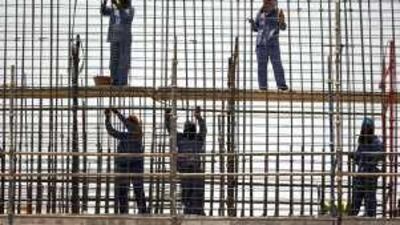DUBAI // A set of minimum standards covering working and living conditions is to be introduced to protect Indian labourers from exploitation, and companies that breach them face action from the UAE and Indian governments. In the Emirates, offending employers could be fined, banned from hiring expatriate workers or have their businesses downgraded. The standards being drawn up in India are aimed at protecting the workers, who often arrive in the UAE to find that the promises they had been given back home about jobs and living conditions are false. Some are given new contracts to replace the ones they signed in India. Under the new system, any evidence of violations would be passed to the UAE's Ministry of Labour, said Talmiz Ahmed, India's ambassador to the UAE. Mr Ahmed has been instrumental in drafting the set of standards, which covers working conditions and accommodation, the most common cause of complaints among Indian labourers who work abroad. The system will involve the checking of labour documents in India, ahead of any employment, to ensure detailed information about working conditions is clearly stated. "Today, the irony is that, in the recruitment of a labourer and his departure, neither the government of India nor the Government of the UAE are in the picture - yet when we have a problem, both are involved," said Mr Ahmed. "So instead of doing the firefighting when the fire has broken out, I plan to have a system that can prevent the fire." Regulations stating the minimum safety, working and living standards, plus other criteria, for labourers working in the UAE will be sent to all India's labour agencies. "I will make this document available to all 18 outlets [airports] from which labour comes abroad, so they will have access to the minimum standards," said Mr Ahmed. "All who have this document should be in a position to match the contract signed by a worker with what is approved from here. Only on the basis of this match will the person be allowed to come." If there was a breach of standards, the governments on either side would have proof and could take action against the companies, said Mr Ahmed. "I will have a document that I approved and can go to the Ministry of Labour with a proof of violation. "The idea is to look at the proposed employment terms and conditions before the actual recruitment is done and ensure that the documents have conditions that our country minimally insists on. "Issues that emerge here in the form of labour strikes are not connected to wages any more. The last time I faced a problem of wages was two years ago. "My bigger problem is not wages but working and living conditions. That is the area of concern for me. "You may get good wages, but if you are living in squalid conditions, without air conditioning, eating inferior food or having to do long hours of compulsory overtime, you won't be happy. So, living and working conditions are as important for me as minimum wages." The new system has been approved in principle by the Indian government after a meeting of ambassadors with the country's Ministry of Overseas Indian Affairs. "I pushed this argument," said Mr Ahmed. The embassy is looking for a company to prepare the software for the programme in time for it to be presented at the next conference of Indian ambassadors in New Delhi in November. "This system is not aimed at targeting agents who take bribes from the workers," said Mr Ahmed. "This will not interfere in recruitment. You still have a right to recruit whom you wish. "My scheme would have broken down if I intruded into the system where agents are taking money from workers to get them jobs. "That is between consenting adults, and if one man wants to give money and the other insists on it, I can't stop it. But I can ensure that the worker is not further exploited once he reaches here." Mr Ahmed said the Indians in the UAE who had been worst hit by the economic downturn were construction workers employed in Dubai. According to embassy figures, 200,000 Indians out of 1.5 million in the UAE had returned home as a result of the slump. An overwhelming majority were labourers, mostly working in Dubai, who returned between December and April, a consequence of building project delays. "As far as the affected Indian individual is concerned, it is a calamity. It disrupts his life and planning," Mr Ahmed said. However, he believed that most would return to the UAE. "A large majority of workers who went home returned on leave without pay," Mr Ahmed said. "Once the project is revived, they will return. Besides, we have not noticed any agitation in India from dissatisfied, disgruntled people. "So the number of people adversely affected is relatively small, given the scale of the crisis globally." More Indians were now seeking work in Abu Dhabi as its construction industry carried on, Mr Ahmed said. "I find that every other day I am approving new recruits of construction workers from India to be deployed in Abu Dhabi." pmenon@thenational.ae

Code drawn up to protect labourers
Companies face legal action if conditions for workers in the Emirates do not match what they were promised at home.
Most popular today
